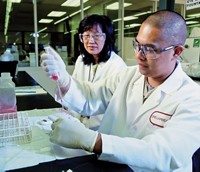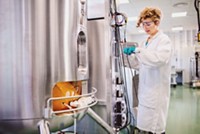Advertisement
Grab your lab coat. Let's get started
Welcome!
Welcome!
Create an account below to get 6 C&EN articles per month, receive newsletters and more - all free.
It seems this is your first time logging in online. Please enter the following information to continue.
As an ACS member you automatically get access to this site. All we need is few more details to create your reading experience.
Not you? Sign in with a different account.
Not you? Sign in with a different account.
ERROR 1
ERROR 1
ERROR 2
ERROR 2
ERROR 2
ERROR 2
ERROR 2
Password and Confirm password must match.
If you have an ACS member number, please enter it here so we can link this account to your membership. (optional)
ERROR 2
ACS values your privacy. By submitting your information, you are gaining access to C&EN and subscribing to our weekly newsletter. We use the information you provide to make your reading experience better, and we will never sell your data to third party members.
Instrumentation
Olympus to sell lab instrument business for $3.1 billion
Deal marks another exit from the research lab to focus on medical market
by Craig Bettenhausen
September 1, 2022
| A version of this story appeared in
Volume 100, Issue 31
$5.53 billion
The combined value of analytical science assets moving from Olympus and PerkinElmer into private equity hands.
Olympus has agreed to sell its scientific instrument subsidiary, Evident, to the private equity firm Bain Capital for $3.08 billion. The deal follows the news in mid-August that PerkinElmer is selling its name and general analytical assets to the private equity firm New Mountain Capital for $2.45 billion. In both cases, the companies are leaving the scientific instrument sector in favor of the faster-growing medical market.
Evident sells optical instruments, such as microscopes and X-ray fluorescence analyzers, as well as industrial endoscopes and related inspection equipment. Olympus says the deal is motivated by a desire to focus on its medical endoscopes and other therapeutic lines. Similarly, PerkinElmer CEO Prahlad Singh said in a press release that its divestment, which includes chromatography and mass spectrometry instruments, will make the remaining firm a “pure-play, high growth, high margin” life sciences and diagnostics company.
The deals are big but expected, and the valuations are fair, according to Vijay Kumar, an analyst who covers instrumentation at the investment banking consultancy Evercore. He says PerkinElmer has been methodically moving toward life sciences and away from analytical instruments. “I’m not overly surprised to see them pivot away from a business where they were not a top-two player and perhaps they were growing below their peer set, and focus their attention more on life sciences,” Kumar says.
Meanwhile, he says, Olympus’s scientific instrument business brought in less than 10% of the company’s revenues. The unit also had little customer overlap with its much larger medical device business, and divesting it lets Olympus simplify its sales and marketing apparatus.
While the sales make sense for PerkinElmer’s and Olympus’s growth plans, the acquisitions are also attractive to private equity because of their stable, positive cash flow, Kumar says.
That’s good news for the analytical scientists who are the business’s customers. “They will run the business in a lean fashion but certainly make investments in R&D,” Kumar says of the new owners. “From an end-customer perspective, if I’m worried about product quality or service, I wouldn’t expect that to fall off. It’s too tough to regain or rebuild the brand later.”





Join the conversation
Contact the reporter
Submit a Letter to the Editor for publication
Engage with us on Twitter